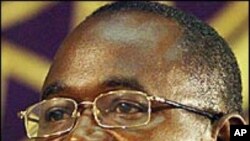The International Monetary Fund said Tuesday that Zimbabwe should stick with its current monetary regime of mixed hard currencies including the U.S. dollar and South African rand for some years to come and that the Zimbabwean dollar should only be reintroduced after the country has instituted sound policies and reformed its central bank.
The recommendation was included in a summary issued following so-called Article IV consultations between the IMF and Zimbabwean officials reviewing the country's economic and financial situation and policy orientation.
The IMF said Zimbabwe's economic outlook for 2010 is “highly uncertain,” noting that public wage costs are crowding out “growth-oriented expenditures” while there has been a “significant slowdown in private capital inflows because of increased uncertainties” about corporate indigenization. Growth could slow “significantly” this year, it said.
The report projected a 2.2 percent expansion of Zimbabwe's gross domestic product after 4 percent in 2009, which reflected a snapback from a 14.5 percent contraction in 2008. Consumer inflation is forecast at 5 percent for 2010 compared with 6.5 percent in 2009 (which saw the end of several years of roaring hyperinflation).
The IMF report noted "significant improvements in policy" which have contributed to growth, and improvement in the humanitarian situation with most schools and hospitals reopened after widespread closures in early 2009.
The government revenue picture improved with revenues and grants rising from less than 4 percent of GDP in 2008 amid severe hyperinflation to 22 percent of GDP or US$975 million in 2009, boosted by indirect taxes. But spending was heavily skewed toward public employment at 53 percent of revenue. "As a result, capital expenditures only accounted for 1 percent of GDP and many social programs remained underfunded" in 2009.
IMF directors "expressed concern about the increasing systemic vulnerabilities in the banking system," adding that addressing the "governance weaknesses of the Reserve Bank of Zimbabwe is crucial for achieving banking system stability." The IMF welcomed the recent appointment of a new governing board for the central bank.
"Directors considered that the multi-currency system would serve Zimbabwe well in the coming years," the report said. "They agreed that the Zimbabwe dollar can be reintroduced as sole legal tender only after a track record of sound policies is established and a central bank governance framework with a focus on price stability is adopted."
In Zimbabwe, meanwhile, sources said relations between Finance Minister Tendai Biti and Reserve Bank of Zimbabwe Governor Gideon Gono have improved significantly, to the extent that some officials of Mr. Biti's Movement for Democratic Change say it won't make much of a difference to them if Gono completes his term until 2014.
Since the enactment of the Reserve Bank of Zimbabwe Amendment Act, Biti and Gono have been working harmoniously, sources said, noting that the legislation clipped Gono’s wings and the appointment of an RBZ board including independent economists and other respected Zimbabweans has also bolstered governance.
Neither Finance Minister Biti and nor Governor Gono could be reached for comment.
Bulawayo-based economist Eric Bloch told VOA Studio 7 reporter Gibbs Dube that Gono can no longer make independent central banking decisions so there is less pressure from the MDC for his departure. “I believe that many within the MDC are of the view that Gono is now toothless and should continue in that post,” said Bloch.
Meanwhile, auctions of RBZ assets ordered to settle central bank debts continue around the country despite the new central bank board that some hoped would spare it further litigation. Attorney Kucaca Phulu said in an interview that the government has no legal instrument at its disposal to halt such auctions.





